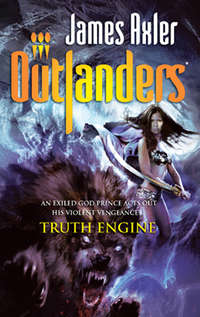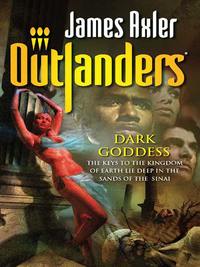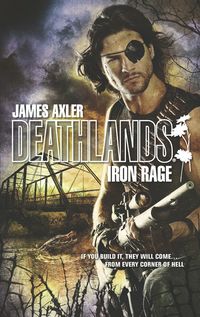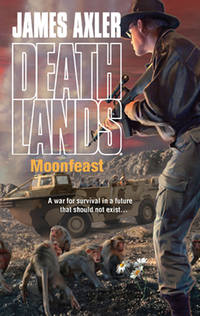
Полная версия
Breakthrough

Ryan looked at his old friend. “You know what to do, J.B.”
His hands up, the Armorer stepped into the line of fire. “Now, take it easy,” he said to the tall, backlit figures just inside the cave entrance. “You know we can’t hurt you. You don’t have to prove anything more to us. We’re giving up. See?”
Black figures approached with their laser rifles pointed at his head. One of them came within ten feet of him before it stopped. “Where are the others?” it asked.
“Yahhh!” J.B. bellowed at the top of his lungs.
Ryan echoed the yell as he swung out from behind the rock. The others yelled, too, as hard as they could, to keep from being deafened as the Smith & Wesson pump gun roared in the enclosed space. Orange flame from the muzzle blast licked the ceiling. Ryan racked and fired, racked and fired as fast as he could. On the third blast, there was a mighty groan from above, then in a cloud of dust, the ceiling of the entry chamber came crashing down.
Other titles in the Deathlands saga:
Pilgrimage to Hell
Red Holocaust
Neutron Solstice
Crater Lake
Homeward Bound
Pony Soldiers
Dectra Chain
Ice and Fire
Red Equinox
Northstar Rising
Time Nomads
Latitude Zero
Seedling
Dark Carnival
Chill Factor
Moon Fate
Fury’s Pilgrims
Shockscape
Deep Empire
Cold Asylum
Twilight Children
Rider, Reaper
Road Wars
Trader Redux
Genesis Echo
Shadowfall
Ground Zero
Emerald Fire
Bloodlines
Crossways
Keepers of the Sun
Circle Thrice
Eclipse at Noon
Stoneface
Bitter Fruit
Skydark
Demons of Eden
The Mars Arena
Watersleep
Nightmare Passage
Freedom Lost
Way of the Wolf
Dark Emblem
Crucible of Time
Starfall
Encounter: Collector’s Edition
Gemini Rising
Gaia’s Demise
Dark Reckoning
Shadow World
Pandora’s Redoubt
Rat King
Zero City
Savage Armada
Judas Strike
Shadow Fortress
Sunchild
Breakthrough
DEATH LANDS®
James Axler

We first crush people to the earth, and then claim the right of trampling on them forever, because they are prostrate.
—Lydia Maria Child
1802–1880
THE DEATHLANDS SAGA
This world is their legacy, a world born in the violent nuclear spasm of 2001 that was the bitter outcome of a struggle for global dominance.
There is no real escape from this shockscape where life always hangs in the balance, vulnerable to newly demonic nature, barbarism, lawlessness.
But they are the warrior survivalists, and they endure—in the way of the lion, the hawk and the tiger, true to nature’s heart despite its ruination.
Ryan Cawdor: The privileged son of an East Coast baron. Acquainted with betrayal from a tender age, he is a master of the hard realities.
Krysty Wroth: Harmony ville’s own Titian-haired beauty, a woman with the strength of tempered steel. Her premonitions and Gaia powers have been fostered by her Mother Sonja.
J. B. Dix, the Armorer: Weapons master and Ryan’s close ally, he, too, honed his skills traversing the Deathlands with the legendary Trader.
Doctor Theophilus Tanner: Torn from his family and a gentler life in 1896, Doc has been thrown into a future he couldn’t have imagined.
Dr. Mildred Wyeth: Her father was killed by the Ku Klux Klan, but her fate is not much lighter. Restored from predark cryogenic suspension, she brings twentieth-century healing skills to a nightmare.
Jak Lauren: A true child of the wastelands, reared on adversity, loss and danger, the albino teenager is a fierce fighter and loyal friend.
Dean Cawdor: Ryan’s young son by Sharona accepts the only world he knows, and yet he is the seedling bearing the promise of tomorrow.
In a world where all was lost, they are humanity’s last hope….
Contents
Prologue
Chapter One
Chapter Two
Chapter Three
Chapter Four
Chapter Five
Chapter Six
Chapter Seven
Chapter Eight
Chapter Nine
Chapter Ten
Chapter Eleven
Chapter Twelve
Chapter Thirteen
Chapter Fourteen
Chapter Fifteen
Chapter Sixteen
Chapter Seventeen
Chapter Eighteen
Chapter Nineteen
Chapter Twenty
Chapter Twenty-One
Chapter Twenty-Two
Chapter Twenty-Three
Chapter Twenty-Four
Chapter Twenty-Five
Chapter Twenty-Six
Chapter Twenty-Seven
Chapter Twenty-Eight
Chapter Twenty-Nine
Prologue
A chunk of burning plastic the size of a softball sailed past Dr. Huth’s lowered head. Smaller objects, bits of concrete, shards of metal and rock, pelted his arms and legs as he struggled down the middle of the street under the terrible weight that lay upon his shoulders, a weight that bent his back to the breaking point and made his thighs tremble.
Seven levels below the surface of the planet, in the swirling smoke of open trash fires, a mob packed the crumbling sidewalks and spilled onto the potholed roadway. Their angry chant of “Die, whitecoat, die! Die, whitecoat, die!” echoed off the two-story-high, gridwork concrete ceiling and the wall-to-wall buildings that lined the gritty street. Like an earthquake, it rattled the No Response Zone’s few surviving windowpanes.
This was Gloomtown, so named because neither the light of day nor the dark of night penetrated here. Mercury-vapor lamps caged in the soot-stained ceiling cast a perpetual sulfurous pall over its squalor and suffering. In Gloomtown there were no police. No emergency services. And there was no way out, alive or dead.
As Dr. Huth advanced along the mob’s gauntlet, grinding out one shaky step after another, tears flowed down his cheeks. Everything he had ever done in his remarkable scientific career, he had done for them. Not for “them” individually, of course, or even for “them” as a social class, but “them” as in, for the survival of humanity.
The survival of Huth’s species had become an issue shortly after the turn of the second millennium A.D., when the long-sputtering population bomb had finally gone thermonuclear. Now, less than a century later, the planet was supporting one hundred billion people, and the rationing of food to the multitudes had become the all-consuming task of science and the one-world government known as FIVE. Because of the shortage of available calories, economic, social and political control teetered on the verge of global collapse. Dr. Huth and the other top scientists of FIVE were like whitecoated little Dutch boys sticking their fingers in a massively leaking dike. Their desperate measures had produced unforeseen and disastrous consequences.
Several structural levels down, a few hundred yards directly below Dr. Huth’s feet, was the border of the Slime Zone, a vast area of the megalopolis made uninhabitable by an invasion of agricultural bacteria, the result of a failed attempt to solve the food problem. In computer simulation, the genetically altered cyanobacteria had looked like a perfect answer to the crisis. They were fast breeding, required no maintenance and were an inexhaustible source of easily digestible protein. Outside FIVE’s biotech laboratories, they had proved themselves all of that, and more.
Once actual cultivation began, despite the protective measures put in place, the tailored bacteria quickly escaped the confines of the deep-level slime farms and began to swallow up the lower sections of the megacity, block by block. All efforts to turn them back, and to reclaim lost territory, had failed. And the irony was, the protein-rich bacteria were no longer even harvested for fear of spreading the contamination.
Because of Gloomtown’s proximity to the Slime Zone, its residents lived under constant threat of suffocation. When the bacterial spores were inhaled, they bloomed in the lungs, rapidly filling them with their wet weight. Only the condensation layer of the atmosphere, a band of land fog at Level Eight, kept the slime at bay. If the climate fluctuated so much as a few degrees, Gloomtown would be enveloped by floor-to-ceiling drapes of smothering green slunk.
The cyanobacteria weren’t the only lethal whitecoat-created hazard Gloomtowners faced on a daily basis. Equally deadly was the carniphage, an escaped biotech mil weapon. When inhaled, it ate a person from the inside out, stripping flesh from bone. The carniphages remained dormant in rivers and lakes for most of their life cycle, but during their reproductive phase, clouds of them were carried on the wind, eating and killing every animal in their path.
When the megacity’s warning sirens announced an impending bloom of carniphages, the people of Gloomtown packed themselves into windowless rooms and closets, and sealed the doors with rags and dirt. Those caught outside were found after the all-clear, their bones picked clean, plastic bags or trash cans pulled over their heads. On the upper levels of the city, for the convenience of FIVE’s CEOs, its whitecoats, and its white-collar support staffs, there were ample, roomy, phage-proof shelters.
How the carniphages had gotten loose in the environment was still a mystery. Some claimed FIVE’s Population Control Service had released them on purpose, to slow the growth of the unemployable class.
“FIVE” stood for the five global conglomerates who, after the big shakedowns of the nineties, had by treaty divided up the rights to exploit the remaining resources of the earth. Those four capital letters were stitched in crimson above the breast pocket of Dr. Huth’s lab coat.
In the boardrooms of the globals, Huth was a very important man, considered a genius comparable to, if not surpassing, Newton, Einstein and Watson and Crick. As director of the Totality Concept, he had shifted the focus of its most advanced research program from time trawling—the dragging of objects or persons from the past or future to the present—to the creation of a passageway between parallel universes. Using Operation Chronos technology as a foundation, he had succeeded in establishing a corridor between nearly identical alternate existences, between his Earth and another, which had come to be known as Shadow World.
After sending robot drones, then a human exploration team through the passage, Dr. Huth had discovered that the event horizons of the twinned Earths had permanently diverged on January 20, 2001, when an all-out nuclear exchange had devastated Shadow World. Though its human population had been nearly wiped out, the catastrophe had left many of its natural resources intact. Which presented a simple, elegant solution to his own Earth’s problems: colonize Shadow World, relieve the population pressure by moving selected, qualified people to the new resources. It was nothing less than a second chance for the human race.
Unappreciated in some quarters.
Under a hail of rocks and burning trash, the tall, lanky scientist strained to keep moving forward with his burden. Perhaps the Gloomtowners had correctly concluded that they wouldn’t be invited to partake of Shadow World’s salvation. Perhaps that was the reason for this horrible mistreatment. If so, it was typically selfish and shortsighted of them.
Then Huth caught a glimpse of a grimy video billboard suspended from the ceiling, and the live picture of himself that was being projected to the crowds. When he saw what he was towing through the streets, he froze in disbelief.
It was a guided missile more than one hundred feet long.
The startling image reminded him of a vid he’d seen as a graduate student. It had shown a single ant struggling to carry an impossibly huge beetle carcass back to the nest. That vid had to have been at least twenty-five years old when he’d viewed it; the last ant and beetle had long since departed this reality.
As Dr. Huth stood there immobilized, gasping for breath, some of the mob dipped into the latrine buckets they’d brought along and splattered him with handfuls of bloody excrement—evidence of yet another failure of science to solve the global food crisis.
The ingenious whitecoats of FIVE had genetically tailored a bacterium whose internal processes could turn igneous rock into something edible. But when the pseudo-fast-food product was consumed regularly, its mineral components built up in the human body, giving rise to a range of alarming physical symptoms, including bloody stools and psychopathic behavior. Despite the known side effects, FIVE dispensed Beefie Cheesies and Tater Cheesies by the truckload to placate the Gloomtowners. The discarded plastifoil wrappers swirled ankle deep around the feet of the mob.
A fresh hail of stones cut Dr. Huth’s cheeks, forehead, and neck. He knew he had to keep moving or be stoned to death. His long legs quaking from the effort, he broke the missile’s inertia, but managed just a few more steps before collapsing under the weight of the nose cone, which pinned him to the street, crushing the air from his lungs and making him pass out.
Merciful oblivion lasted only a heartbeat.
Dr. Huth awoke with a gasp, his burden gone. He flew upward in a metal mesh cage, his wrists shackled together with two feet of chain. Looking up from his manacles, he realized he hadn’t completely escaped the missile. It now stood upright, its riveted skin gliding past him in a white blur as the elevator rose.
He also sensed he wasn’t alone in the cage.
Dr. Huth whipped around, and in so doing came face-to-face with the human from the parallel world, the man he had ordered brought back to Earth for examination and interrogation. This was the same tall, rangy savage who had somehow managed to escape not just FIVE’s custody, but its reality, as well, and in so doing had created untold havoc and destruction.
The one-eyed man stared back at him with malice. A scar from a knife slash, like a crudely drawn lightning bolt, divided his left brow and cheek above and below the black eye patch he wore. Black curling hair fell almost to his shoulders. A leather sheath strapped above his left boot carried a huge knife. In his right hand he held an equally massive chromed wrench.
Though he called himself Ryan Cawdor, FIVE’s media consultants had renamed him “Shadow Man,” and turned him into a symbol of hope for the starving masses. His birthplace on the parallel Earth was Deathlands, the heavily nuked, former United States of America.
“Why have you come back here?” Dr. Huth said. Behind Cawdor, a half-dozen children—filthy, hollow eyed, swollen bellied—clung like monkeys to the outside of the rising elevator cage. Huth ignored their bony little outstretched hands and demanded, “Where are you taking me?”
Shadow Man didn’t answer either question. He held something inside his mouth, a round shape that bulged against the dark stubble of his cheek.
When the gantry elevator stopped, once again Dr. Huth faced the tip of the missile. He was relieved to see that there was no door in the side of the nose cone, and therefore no possible way he could be placed inside.
Shadow Man spun him, and with a forearm crushing against the front of his throat, pinned his back to the nose cone. Cawdor then grabbed the manacle chain and jerked it up, forcing Huth’s arms above his head. Though the scientist struggled, the one-eyed man easily controlled him. Cawdor fitted a bolt through a chain link, threaded it into a matching hole in the nose cone and, using the chromed spanner, quickly torqued it down.
As Cawdor retreated a step, Dr. Huth bawled, “Why are you doing this to me?”
Shadow Man smiled and curled back his lips. Between his front teeth he held a human eyeball with a sky-blue iris. Its color and size perfectly matched his good right eye, as well it should have. Dr. Huth had had the eye genetically reconfigured to fit him, a replacement for the one Cawdor had lost to a knife slash years ago. The gift had been intended as an awe-inspiring demonstration of the biotechnological power of this reality, and of how cooperation with FIVE was rewarded.
When the scientist started to speak, Cawdor lunged forward, slamming a forearm back across his windpipe. Shadow Man took the severed eyeball from his own mouth and shoved it between Dr. Huth’s teeth. His lips clamped shut by a callused palm, Huth could do nothing but whimper as the savage wound turns of duct tape around his head, sealing the eyeball inside.
While the scientist tried not to strangle on the mouthful, the monkey children rattled the cage’s mesh, mocking his predicament by inflating their cheeks with air and bulging and crossing their eyes.
From the foot of the gantry, the rhythmic chanting of the Gloomtowners resumed. Shaking and pushing the structure, the mob rolled the gantry away from the missile. Huth’s feet slipped off the edge of the platform’s floor, and his full weight dropped onto his upraised wrists. His muffled shriek of pain was followed by a raucous cheer from below. As he dangled from the nose cone, as the gantry continued to retreat from the launch pad, the elevator started its rapid descent. Ryan Cawdor and the monkey children dropped from view, abandoning the scientist to his fate.
Which he now realized was a twenty-second-century version of crucifixion.
He was being punished for his contributions to a better way of life, to freedom from hunger and illness, the eternal banes of humankind. He had offered his world the salvation of science and in return…
A terrible rumbling came from below.
It grew louder and louder, and as it did, the vibration set his guts shimmying and made the trapped eyeball quiver between his tongue and the roof of his mouth. With a blast of flesh-melting heat, and the deafening bellow of wide-open rocket motors, the missile leaped upward. The jolt of liftoff caused the eye to slip back into his throat, blocking his airway. Huth had no choice; he gulped it down whole.
As the missile climbed and climbed, engines roaring, his body buffeted against the missile, his arms felt as if they were about to tear free of his shoulder sockets and the swallowed eye rolled around in the pit of his belly like a cannonball.
DR. HUTH AWAKENED on his hands and knees, retching. The violent spasms seemed to start from the soles of his feet, rippling through all the muscles of his body, building a terrible momentum that peaked as they reached his throat. He dry-heaved, over and over. Long strands of bile trailed from his lips into the powdery red dirt beneath his face.
When the convulsions finally subsided, he slumped onto his side. Disoriented and confused, Huth clung like a drowning man to his only clear memory. Moments ago, he had been in the Totality Concept’s trans-reality laboratory. He had been there when the missile he had already sent across to Shadow World, a missile meant to put a recon satellite in orbit, had nosed instead back to his Earth, back through the shimmering lips of the passageway, its gigantic rocket motors thundering.
How that singular horror had come to pass, he had no way of knowing, but certainly the goal of firing the missile back through the corridor had been to destroy the connection between parallel worlds. Given the fuel capacity of the missile, and the fuel’s volatility, there was every reason to expect the strategy had worked.
Huth had a much less distinct recollection of being sucked through the reality portal in the backwash from the rocket’s exhaust, like a dry leaf caught in a whirlwind. That memory was jumbled with a nightmare of horrible punishment and death. Thinking about it made his mind wheel violently, so he forced himself to stop and pushed up on an elbow.
He was surrounded by an open space that stretched unbroken to the horizon in all directions. The sudden absence of physical boundaries, of human-scale walls and ceilings, filled him with heart-pounding panic, but he resisted the urge to bury his head under his arms.
Above him, the dome of the cloudless sky was still tinged with the rose-pink of dawn. The sparkling air felt strangely light in his lungs, and so dry it tickled inside his nostrils. He sat near the edge of a broad, flat table of rock the color of dried blood, elevated above the surrounding plain by several hundred feet.
The mobile missile gantry was nowhere in sight. Also missing were the five explorers who had preceded him through the passage. If this was Deathlands, and he had no reason to doubt that it wasn’t, he had been deposited in a different spot, perhaps near the original landing site, perhaps not. Huth could only surmise that either the missile’s full-power reentry into the passage or its subsequent explosion at the heart of the Totality Concept complex had distorted the shape of the reality corridor, shifting its terminus at this end.
Huth rose stiffly to his feet and took stock of himself. The left sleeve of his lab coat was fire-blackened from cuff to elbow, but he wasn’t bleeding anywhere and he had no apparent broken bones. He patted his pocket and was relieved to find the instruments he’d slipped into it moments before the disaster. Both the microcomputer, which was the size of a playing card, and an equally small electron microscope seemed to have made the journey intact. The other scientific tool he’d brought along he carried locked away in his brain, and that was the Twenty-five Theories, which linked all human knowledge. With just these three artifacts, he was confident that he could reconstruct most of the advanced technology of his Earth.
Though the timing of the crossing had been accidental, Huth had been on the verge of departing his reality, with or without FIVE’s approval. The most recent computer projections gave nine-to-one odds that the predicted mass die-off of humanity would occur within the next three months. Based on past experience with the CEOs, he couldn’t be one hundred percent certain that they would let him use his own invention to escape. That decision had been taken out of FIVE’s hands, and thanks to what he carried in his pocket and brain, Huth was in a position to become the most powerful man in the history of either Earth—as he saw it, a combination of Leonardo da Vinci, John D. Rockefeller and Joseph Stalin.
Huth stepped to the edge of the deeply rilled, red rock mesa. There were more mesas in the distance on the other side of a wide desert plain, and far behind those table rocks loomed a range of snowcapped mountains. Bisecting the plain were remnants of a prenukecaust highway, a ribbon-straight ghost of four-lane interstate. Lying across the old highway at odd intervals were great, tilted slabs—the fractured remains of fallen overpasses. At the horizon line to the northwest, the sun glared off something shiny. A body of water, perhaps. If the passageway’s terminus hadn’t shifted very far, it occurred to him that it might even be the remains of the Great Salt Lake.
As he continued to scan the landscape below, Huth saw white smoke rising in a thin column in the dead still air, indicating a human presence, if not a settlement of some sort, not more than ten miles away.









